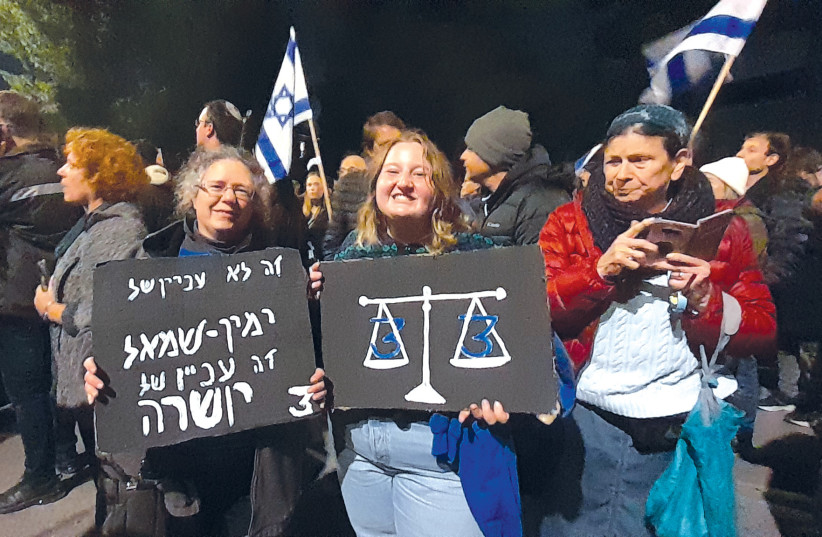The first law of the judicial overhaul has been passed, the Knesset has started a three-month recess, and the kids are on August school vacation. It would make sense that the protests too would also take a break, coming back when the Supreme Court starts hearing a landmark case against the judicial reforms in mid-September.
But the protesters say they will continue their weekly demonstrations that have often drawn hundreds of thousands of people across the country, especially on and around Kaplan Street in Tel Aviv.
“We now understand that we are in the process of rebuilding a democratic liberal camp, and we need to enhance our activity,” protest leader Dr. Shikma Bressler told The Jerusalem Report. “We are protesting to save this country, and we will do whatever it takes.”
“We are protesting to save this country, and we will do whatever it takes.”
Shikma Bressler
Bressler, a physics professor at the Weizmann Institute of Science, said she never intended to become a protest leader but said she was thrust into that role by the circumstances.
“This government has revealed its intentions and its ideology, and they are willing to sacrifice everything that is good in this country to achieve their ideology,” she said. “We can only move forward. It’s a historical crossroads for Israel, and we can either go to dark days like in Hungary or Poland or we can strengthen Israeli democracy to secure it for generations.”
In fact, one of the popular street chants at the demonstrations is “Yariv Levin, Po Ze Lo Polin” meaning “Yariv Levin [Israel’s justice minister and architect of the judicial overhaul], it’s not Poland here.”
Fighting for the future of the children of Israel
Shoshana Baumgarten, an interior designer in Jerusalem, has participated in 42 protests in the past 30 weeks.
“I am on the streets because I fear for my kids’ future in this country,” she told The Report. “I think the laws being passed and in the pipeline are outrageous laws that will change our society on every level. They will affect our economy, security, religious freedoms, and basic civil rights. I especially fear their effect on me and my daughter, since they try to turn back the clock on any gains we have had as women and other minorities. This government is the most corrupt, power-grabbing bunch of leaders we have ever had, and they aim to grab as much power as possible and abuse it. All the while tearing apart our society that is getting more divisive every day.”
She said she thought the demonstrations would continue through the summer and that activists in the demonstrations may run in the upcoming municipal elections in late October. She also expected the protests to pick up around mid-September, when the Supreme Court is scheduled to hear petitions against the new law.
While protests in the past have often been held by the extreme Left or extreme Right, these large-scale protests seem to have attracted a broad swath of the center, including some who voted for Prime Minister Benjamin Netanyahu’s Likud party, such as Jerusalemite Marne Rochester. She described herself as an “extreme centrist.”
“I’ve voted for Likud more than once, but that was the Likud of Benny Begin, Dan Meridor, Limor Livnat, and a very different Bibi,” she said, referring to Netanyahu’s nickname. “To be honest, I’m not sure if the protests are effective or not. All the protests have not stopped the government from going ahead with their overhaul, as we saw last week when the cancellation of the reasonableness law passed. I was unable to come during the day, but right after work I put on my shirt and grabbed my flag and went to Gan Sacher [Sacher Park]. I needed to scream about what was happening instead of staying home and wallowing. But marching with all those people was actually very uplifting and hopeful.”
That feeling of solidarity is one of the reasons that people join demonstrations, said Tamar Hermann of the Israel Democracy Institute.
“People feel they are part of something – it’s almost a kind of Woodstock,” she said, referring to the 1969 hippie music and art fair in the US that was attended by more than 400,000 people. “People who attend get a “participation reward.” It might be very hot or crowded, but with the music and lights, people feel they are participating in a democracy festival.”
Israel has seen large protest movements before. In 2011, a wave of social protests swept the country against high prices. Known as the “cottage cheese protests,” thousands of young people pitched tents on Rothschild Boulevard in Tel Aviv for weeks. Hundreds of thousands attended demonstrations, and then a few weeks later the government made a few concessions on prices of some items and the demonstrations ended.
There was also a very large protest of 400,000 Israelis in Tel Aviv demanding an investigation (which later happened) of the Israeli involvement in the 1982 massacres of Palestinians in the Sabra and Shatila refugee camps in Lebanon by Israel’s Christian allies, but that was a one-time demonstration.
There were also a series of protests, some violent, against Israel’s withdrawal from Gaza in 2005, but the numbers did not reach the hundreds of thousands involved in the current demonstrations.
Some of the demonstrators say they are seriously considering leaving the country because of the judicial overhaul. A new WhatsApp group of doctors considering relocation has thousands of members, and government officials say they are concerned that if 500 doctors leave as planned, it could wreak havoc on the medical system.
One of those doctors who has begun investigating options abroad is Noam, a psychiatrist in the center of the country, who asked that his real name not be used. His wife works in hi-tech and has begun applying for positions abroad. Noam has joined the WhatsApp group of doctors looking to relocate. He said that New Zealand has a shortage of psychiatrists, and he has some serious possibilities. He has two young sons, aged four and seven.
“I love my country, and it really makes me sad to be considering leaving,” his wife told The Report. “Not living in the place you are rooted has its price. But we’re thinking about our boys and what will be their future in 20 years when they want to start having children. The way things look right now, we are not going in a good direction.”
She said that her oldest son will be drafted in 10 years, and she would not be willing to send him to the army if the country looks like it does now.
Noam’s sister and her husband, both doctors, already moved to New York a few months ago. Their closest friends left Israel for a new life in the US several years ago. Noam might need to do residency again; a price the couple say they’re willing to pay.
While his wife’s parents are no longer alive, Noam’s parents said the family should not stay in Israel for them, and they are also considering leaving. The decision about whether to leave is keeping them up at night, his wife said.
Israeli analysts say this potential brain drain is dangerous for Israel’s future.
“Nothing worries me more than the prospect of the emigration of our best young people – the people who keep Israel modern, democratic, who connect Israel to the wider world, the global economy,” Yossi Klein Halevi of the Hartman Institute told The Report. “These are the people who are the backbone of what we call the Start-Up Nation, the Israeli success story.”
Economists say the consequences of the decision are already being felt.
“The value of the shekel has depreciated 17% over and above what would have been predicted by normal market conditions. That is a lot,” said Yannay Spitzer, an economics professor at the Hebrew University of Jerusalem.
“Moreover, we see that since the elections, the Israeli stock exchanges have been severely under-performing. This implies a loss of growth on the order of NIS 300 billion, which is about $80 billion. And this is by the time that just one law is passed.”
Many say that if the Supreme Court upholds the law and if the government moves ahead with more legislation as it is promising to do, the economic situation will get even worse. ■

